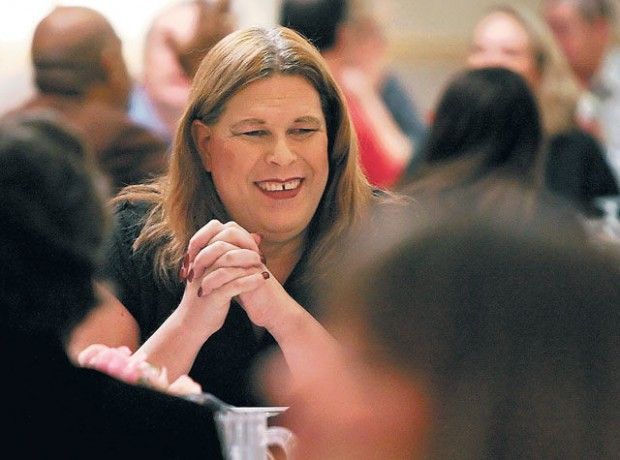"You people don't exist."
Air Force veteran Diane Steen, who was born male and had surgery to become a woman, still gets steamed when she recalls the comment from a staffer at Tucson's veterans hospital, where Steen is a patient and a longtime volunteer.
The remark came, she said, when she asked the staffer, who had a military background, how much training he had received about people like her.
Officially, transgender patients barely do exist in the Veterans Affairs health care system.
They often are denied treatments that experts say could help them most.
National Department of Veterans Affairs policy — now under review — specifically forbids veterans hospitals to perform or pay for "transsexual surgery." It also does not provide for the related health care that experts recommend, such as psychotherapy, hormone treatment and other measures.
Officials at VA headquarters, given 10 business days to answer, said they couldn't determine how many transgender patients are in the VA system nationwide.
Officials at the Southern Arizona VA Health Care System — Tucson's veterans hospital — said 48 VA patients in Southern Arizona are transsexual or have been diagnosed at some point with "gender-identity disorder," the medical term that covers such cases.
A national advocacy group estimates that about 300,000 active or retired military personnel are transgender, though experts say an accurate count is impossible because many live under the radar to escape social stigma.
In June, the American Medical Association approved a new policy on the care of transgender patients, effectively putting VA policy at odds with the recommendations of the nation's largest doctors group.
The association said gender-identity disorder is a "serious medical condition . . . which causes intense emotional pain and suffering" and can lead to stress-related illness, chronic depression and suicide if not properly treated.
The group urged all public and private medical insurers to cover the cost of mental health care, hormone therapy and sex-reassignment surgery whenever doctors deem them medically necessary.
Experts worldwide "have rejected the myth that such treatments are 'cosmetic' or 'experimental,' " the AMA said.
VA examining policy
A spokesman for national VA headquarters, in a recent e-mail to the Arizona Daily Star, said the VA is taking a second look at its policy banning transsexual surgery at veterans hospitals.
"VA is in the process of rewriting its directive excluding gender-reassignment surgery and will be conducting a review of the evidence base on this issue," VA spokesman Terry Jemison said. "The current policy may continue or may change, but our decision will be based on the available evidence, not on the AMA's resolution."
The American Medical Association said many surgeries that help transgender patients — such as removal of breasts, testicles or ovaries — are routinely covered for other patients for various medical reasons.
Denying such coverage to transgender people "represents discrimination based solely on a patient's gender identity," the doctors group said.
Jemison said that while the VA doesn't routinely provide such care, officials "don't rule out the possibility of exceptions."
The VA policy that bans surgery also says the VA won't carry out "any process or procedure involving genital identity revision."
Interpretations of that phrase vary widely from one VA hospital to the next — and even from one VA employee to the next — resulting in vast disparities in how such patients are treated, advocates say.
At some VA hospitals nationwide, staffers have been known to shut the door on transgender veterans, turning them away for even routine medical care unrelated to their gender disorder, a survey last year by the Transgender American Veterans Association found.
Of the 240 veterans surveyed who were part of the VA system, 10 percent said they had been turned away for service because they were transgender. Nearly one-quarter said they had been mocked or insulted by VA staff members.
Jemison, the national VA spokesman, said the VA "does not condone withholding delivery of routine medical care for transgender patients anywhere in our system."
It depends on the doctor
Some VA hospitals — those in Tucson and Boston, for example — are seen as more liberal in their interpretations of VA rules.
The Southern Arizona VA Health Care System says it routinely provides hormone therapy to veterans transitioning from one sex to another — testosterone for biological women becoming male, to help them grow beards and reduce feminine curves, and estrogen for biological men, to help them grow breasts.
Mick Andoso, an Air Force retiree who served as a female and now is male, receives hormone treatments at the Tucson veterans medical center, and he says he's satisfied with his care.
Steen, on the other hand, said she was denied hormone therapy at the local VA as she prepared for her privately obtained sex-change surgery. That forced her to find an outside doctor and cover the cost herself.
"It all depends what doctor you get," Steen said of VA care.
Erin Russ of Tucson, a former Army officer who is transgender and a VA patient, agreed.
Tucson VA staffers "are mostly accepting. But there are a few who basically hold the line that we are crazy, and they refuse to deal with us on any other basis," said Russ, who teaches transgender awareness workshops at Wingspan, the local gay, lesbian, bisexual and transgender resource center.
Dr. Jennifer Vanderleest, an assistant medical professor at the University of Arizona, got a similar impression of the Tucson VA staff when she conducted a training session on transgender health care two years ago.
"Overall, it was well-received, but there was a little push-back from some of the providers, and one doctor in particular, who felt that some of this is controversial," she said. A VA patient later told Vanderleest that the resistant doctor she encountered was disrespectful toward transgender patients, she said.
Pepe Mendoza, a spokesman for the VA in Tucson, said he couldn't comment directly on the incident Vanderleest described without more details, but he did say that "all veteran patients are treated with respect and courtesy."
Vanderleest said ignorance and prejudice are common in the medical community because most practitioners — inside and outside the VA — haven't received any training on transgenderism.
"They don't really know how to handle this," she said. "There is a lot of misunderstanding about who a transgender person is and what this all means."
It appears that only one VA hospital in America has a written policy spelling out how transgender patients should be cared for.
Jillian Shipherd, a clinical psychologist at VA Boston and a pioneer in improving health care for such veterans, said Boston's written policy also protects her hospital's staffers from being disciplined for providing certain types of help.
Some VA staffers nationwide — Shipherd did not want to say where — "have gotten in trouble with their local administrations" because VA rules "are interpreted very differently from place to place."
Exclusions are widespread
The VA isn't alone in not covering surgery for transgender patients. The Human Rights Campaign, a national advocacy group, recently surveyed about 1,300 colleges, law firms and major corporations, finding 52 that provide full coverage for transgender care.
When the city and county of San Francisco made the change to cover transgender medical care in 2001, critics feared it would be pricey. Cost estimates ranged as high as $1.7 million a year.
But not all transgender patients seek surgery. The total tab over five years was $386,000 — so little that the municipality dropped a $1- to $2-a-month surcharge initially charged to its 80,000 insured to pay for the extra coverage.
Advocates for transgender veterans are keeping their fingers crossed that the VA's policy review will lead to changes.
"I think we can all agree that these are veterans, they served our country and they deserve our respect," said Shipherd, the Boston VA psychologist.
"And they deserve quality health care. No exceptions."
Studies of brains, DNA find transgender physical differences
Is being transgender a choice?
Some experts believe the question itself is rooted in prejudice, yet it often arises when the topic is discussed.
The study of how sexual identity develops is relatively new, spurred in part by recent developments in genetic research.
So far, medical science hasn't been able to pinpoint why some people born as one sex instead identify with the other.
Some recent studies point to possible biological underpinnings, although experts caution that it's too early to draw firm conclusions.
The American Psychological Association says there may not be just one cause but, perhaps, varied combinations of factors — genetic, hormonal and environmental.
"The diversity of transgender expression argues against any simple or unitary explanation," the group says on its Web site.
In 1995, researchers at the Netherlands Institute for Brain Research autopsied and compared the brains of heterosexual men and women, homosexual men, and transsexuals who were born male and had surgery to become female.
In one of the brain structures that may govern gender identity, transsexuals' brains were more similar to female brains than to those of males, the researchers found.
In 2003, scientists at UCLA studied the genes of embryonic mice and found that the maleness or femaleness of their brains was apparent before they ever developed sex organs.
"Our findings may explain why we feel male or female, regardless of our actual anatomy," Dr. Eric Vilain, an expert in sexual development and an associate professor at the UCLA medical school, said in a news release put out by the university at the time.
And a 2008, study by Australian researchers compared the DNA of more than 100 transsexuals who were born male and became female with the DNA of more than 200 biological men.
The transsexuals were more likely to have a genetic variant believed to reduce the signaling action of testosterone, the male sex hormone, in the brain during fetal development, the study found.
Dr. Jennifer Vanderleest, a Tucson physician who has worked with more than 100 transgender patients, does not believe "that transsexualism, or being transgender, is a choice."
"In my opinion, it seems that this issue of choice is often used to perpetuate discriminatory practices" against such people, she said.
Clinical psychologist Jillian Shipherd, who works with transgender veterans in the VA Boston Health Care System, agreed.
Many health conditions, such as heart disease and diabetes, are fueled by poor lifestyle choices, yet no one questions the need for proper medical care in those cases, she said.
"For anyone who thinks (being transgender) is a choice, I wish they could be a fly on the wall in my office," Shipherd said. "Why would anyone choose this when it's such a difficult road?"






